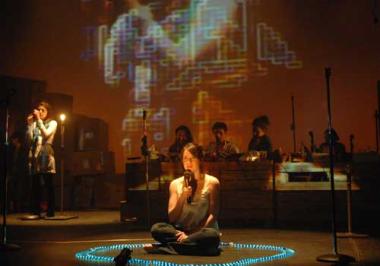The Ordinary Theater is no ordinary theater. What fascinates its founder and director, Mitchell Polin, isn't linear narrative but the thrill of capturing the "simultaneity of action" that surrounds us every day. "We're at our computer and three windows are open and there's a radio playing," he says. "I'm trying to bring that simultaneity, those different layers of action, into the theater space. So there's music playing, bodies speaking, video happening, and all these are acting simultaneously and informing each other."
"Everyone only wants a nice linear adventure," says one of the players in his latest production, addressing the audience. "I say, strap in, 'cause the ride is going to get bumpy. And that's great. Why shouldn't the ride be bumpy?"
There's an irony here. Our Town Revisited, which plays at Northampton's Academy of Music this weekend, wasn't supposed to be all that bumpy. Polin, who teaches theater at Trinity College in Hartford, says his intention was to stage Thornton Wilder's Our Town exactly as written. He just wanted his longtime collaborators, the New York-based trio Tungsten74, to provide a live musical through-line to underscore the play's rhythms.
But he couldn't get approval from the playwright's estate. According to Polin, they told him, "If Thornton Wilder had wanted music in it, he would have provided music for it." Insisting that the work be simply replicated isn't just another victory of copyright license over artistic license. It's a repudiation of the author's intention.
Our Town is an enduring masterpiece—perhaps the defining American drama—not because it's a bittersweet story of small-town life that's been on every high school stage in the country, but because it frankly acknowledges the conventions of live theater, then strips away the naturalistic trappings and invites the audience to fill in the spaces with their own imaginations. And those assumptions are precisely Ordinary Theater's.
Polin's response to the rebuff was to thoroughly "revisit" Our Town by expanding, exploding and at times parodying its format and themes—"smashing it up" in order to convey "both the story and the experience of it."
For Polin, Our Town asks "very basic questions about living—about the construction of identity through repetition, about the relationship of our dreams to our lives, about memory and the imagination. I think Thornton Wilder's play is wonderful because it ignites the memories of the audience and engages our imaginations. We see objects where there are no objects, we fill in the layers of events with the events of our own lives. That's what we're trying to tap into in this production."
At the beginning of Wilder's Our Town, the narrator, called "the Stage Manager," introduces the actors by their real names and asks us to imagine the setting, Grover's Corners, New Hampshire, on the bare stage. Revisited goes a couple of steps further. Most of the characters have the same names as the actors who play them, and the two narrators candidly place the action on the stage of the Academy of Music and present a PowerPoint overview of Northampton. Real and make-believe intertwine like DNA. Three of the actors— Kelsey Flynn, Claire Kavanah and Matthew Bamberg-Johnson—are from this area, and one of the others, Teri Incampo, says she is but isn't really.
Wilder, writing in the 1930s, set his play in a horse-and-buggy past, but Polin's world is right now. Adding to Our Town's timeless themes, Revisited also questions how 21st-century technology mediates relationships. Video screens show recorded and live images, and the actors speak into microphones, not just to compete with the musical underscore but because, Polin says, "The microphone is a huge part of what we see in our lives, whether it's in the hand of a rock star or a talk-show host. And we spend a lot of time talking into a microphone ourselves, the most obvious one being the cell phone."
Our Town Revisited contains playful echoes of the original. Miniature stepladders dot the stage, recalling Wilder's most distinctive staging device. The characters in Our Town don't notice that the walls of their stage-houses are invisible, but here one of the actors does, and is freaked out that people might watch her sleeping and "pooping."
For Polin, the key question in Our Town is this: "What does it mean to have choice in your life?" In that play, the oblivious repetitions of everyday life dull the options, along with the possibility of realizing life as we live it, "every, every minute." Here, the question of personal agency mixes with the play's self-consciousness of its theatrical conventions. One of the actors is told, early on, that at the end of the play she will kill someone—with a prop knife made of cardboard and tinfoil. "But it's a magic knife," she's assured. "It'll work."
And that, after all, is the magic that theater lives on—the unspoken contract that Wilder, and Polin, make explicit. It's about all of us, actors and audience, gathered in a dark room, agreeing to imagine that the cardboard and tinfoil are real, in a way the real real world can't begin to match.
Our Town Revisited: Academy of Music, 274 Main Street, Northampton, April 17-19, CABOtix.com, (413) 582-1332.



